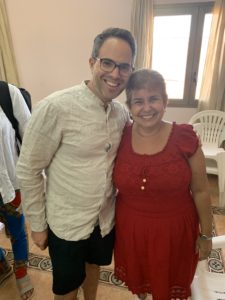Information derives from a lecture by Cuban Criminal Justice and Cooperative Attorney Oldalys Perex Martinez, on January 15, 2020

We’re mainly taught in the U.S. that Cuba is “ruled” by a militaristic, one-party, authoritarian regime (e.g. links intentionally omitted). The on-the-ground perspective in Cuba is quite different; so too are the facts. Cuba’s people democratically developed and adopted their first constitution since the 1959 revolution in 1976. More than 6.2M citizens participated at the grass-roots level in discussing, debating and adopting the 1976 constitution, which was approved by more than 99.02% of voters, with 98% voter turnout.
Cuba held a constitutional referendum on February 24, 2019, to adopt a series of sweeping and progressive reforms. This 2019 constitutional referendum were discussed openly at all levels of civil society (more than 66% of proposed constitutional articles were amended on the basis of public input prior to the ultimate referendum vote). The ultimate series of constitutional reforms were approved by 6.8M votes, representing more than 90% of valid votes cast, with more than 90% voter turnout. The 1976 Constitution created a host of affirmative and progressive rights.

The 2019 constitutional reforms focused on social, political, economic themes and are widely viewed as progressive, intended to increase local governmental autonomy, improve human rights and to increase access to foreign investment. The new constitution requires a sweeping set of reforms to statutory law and regulatory codes, particularly in the area of family law (see more below), the criminal law and others.
Notably and impressively, the 2019 Constitution created 24 brand new rights and guarantees, including:
- free transit;
- recognition of private property;
- truth from the government;
- universal and unlimited human rights (this was to harmonize Cuba’s law with the U.N. International Human Rights Convention);
- imprisoned people to be re-introduced into society;
- right to work;
- food security;
- prohibition of child labor;
- sec and reproductive rights of women and for women to be free from gender and sexual violence;
- dual citizenship;
- to have whatever type of families (emphasis added) (this is thought to be a politically negotiated compromise to lay the foundation for a revised family code that protects LGBTQ rights. The new family code will be subject to another national referendum)(“An earlier draft of the new [C]onstitution would have changed the language to “a union between two people” … “with absolutely equal responsibilities”. This language was removed due to backlash from the more conservative sectors of Cuban society,with the new constitution not specifically recognizing gay marriage, but still removing the constitutional obstacles to its recognition by specifically avoiding to define marriage (as opposed to the definition of “a union between one man and one woman” that existed in the old constitution)“);
- due process under the law;
- presumption of innocence;
- independent, impartial and competent tribunal;
- counsel in a criminal proceeding;
- confront one’s accuser;
- present a defense;
- appeal; and
- reparations and indemnification.
The new Constitution went into force by proclamation of the National Assembly on April 10, 2019. The more than 60-laws to enforce the new Constitution must be enacted within 18-months, including the new Family Code. Note that cooperatives are not expressly mentioned in the new Constitution, however, the tripartite cooperative laws are believed to remain intact.
 Many observers believe the revised Family Code will involve a contentious debate over LGBTQ rights and same sex marriage, however, it is expected that same sex marriage will be part of the new Family Code.
Many observers believe the revised Family Code will involve a contentious debate over LGBTQ rights and same sex marriage, however, it is expected that same sex marriage will be part of the new Family Code.
To resolve disputes over interpretation of the new Constitution, particularly as the enabling statutes are being adopted, Cuba’s Supreme Court has jurisdiction. Cuba’s Supreme Court, 66% of whom are women, are elected to 5-year terms, with 2 term limits.
Cuba’s voting age is 16-years old. I’ll close by restating that both of Cuba’s constitutional referenda were approved by more than 90% of votes cast, and with more than 90% voter turnout.
